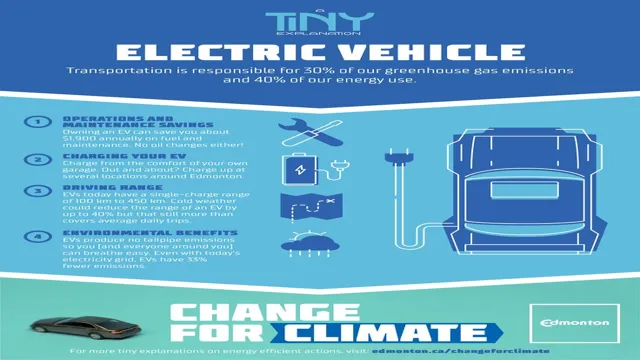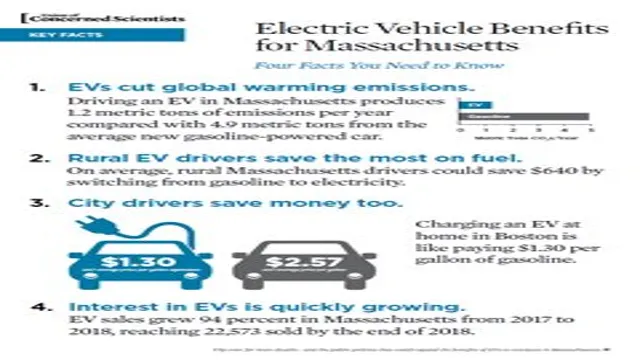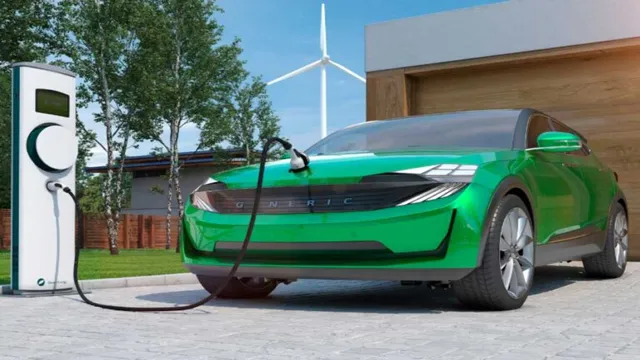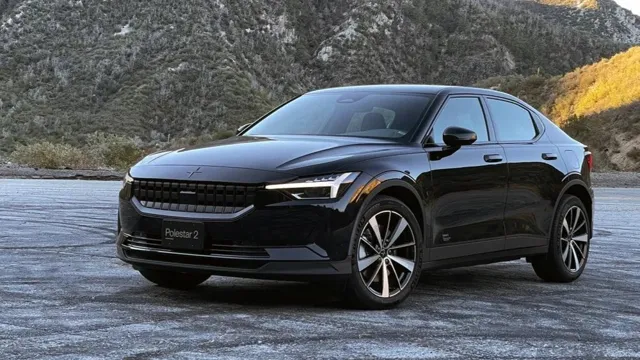Revolutionizing the Future: The Environmental Benefits of Electric Cars
Electric cars have emerged as a promising solution to reduce air pollution and conserve the environment. Not only do they run efficiently but also do not produce any harmful emissions, thereby providing a cleaner mode of transportation. As we become increasingly aware of the negative impact of fossil fuels on our planet, electric cars present themselves as an eco-friendly alternative with impressive benefits.
However, the transition towards electric vehicles is not without challenges. In this blog, we will explore how electric cars are essential in protecting the environment and the technological advancements needed for its widespread adoption.
Reduced Emissions
Electric cars offer a long list of benefits to the environment, and one of the most significant ones is reduced emissions. Unlike traditional gasoline-powered cars, electric cars don’t emit harmful greenhouse gases when they’re driven. This means that they don’t contribute to air pollution, which is a major problem in many cities around the world.
By switching to an electric car, you’re helping to reduce your carbon footprint as well as improve air quality in your community. Moreover, over the lifespan of an electric car, they produce much less carbon emissions than gasoline cars. That means by driving an electric car, you’ll be reducing not only your ecological impact but also your overall carbon footprint.
Imagine if everyone made the switch to electric cars, how much cleaner and healthier our air and planet would be!
Comparison with Gasoline Cars
When it comes to comparing electric cars with gasoline cars, reduced emissions is one of the major advantages of the former. EVs emit zero tailpipe emissions and their net carbon footprint is much lower than their gasoline counterparts. This means that driving an electric car causes less harm to the environment and contributes towards a cleaner and healthier planet.
EVs also have lower emissions during the manufacturing process as they do not require oil refineries, which are major contributors to greenhouse gas emissions. Furthermore, as renewable energy sources are becoming increasingly more accessible, the carbon footprint of an electric car is set to decrease even further. Driving an electric car not only benefits the environment, but also saves money on fuel costs and requires less maintenance.
Overall, reduced emissions is a major benefit of electric cars that makes them a more sustainable and eco-friendly option compared to gasoline cars.

Impact on Air Quality
Reduced emissions have a significant impact on air quality. The reduction of harmful pollutants emitted by vehicles, factories, and power plants can lead to cleaner and healthier air for us to breathe. When we reduce emissions, we reduce the amount of particulate matter and ozone in the air that can cause respiratory diseases, such as asthma and bronchitis.
The reduction of emissions also lessens the risk of cardiovascular problems. The impact of reduced emissions can be felt both locally and globally. Locally, the air quality improves, leading to better health for the local population.
Globally, the reduction of greenhouse gas emissions helps to tackle the problem of climate change. It is important that we continue to reduce our emissions to ensure a healthier future for ourselves and our planet.
Renewable Energy Sources
Electric cars have a substantial positive impact on the environment due to their use of renewable energy sources. By using electricity stored in batteries instead of traditional fossil fuels, electric cars produce zero emissions while driving. This eliminates harmful pollutants emitted by gas-powered cars, such as carbon dioxide and nitrogen oxide, which contribute to air pollution and global warming.
Furthermore, by utilizing renewable energy sources such as solar and wind power to recharge these batteries, electric cars have the potential to be completely emissions-free. In addition to being environmentally friendly, electric cars also offer other benefits such as improved energy efficiency, reduced dependency on foreign oil, and cost savings for drivers due to lower maintenance and fuel costs. Overall, the adoption of electric cars with renewable energy sources has the potential to greatly reduce the environmental impact associated with transportation.
Electricity from Solar Power
Renewable Energy Sources Solar power has become increasingly popular over the years as a renewable energy source. It is a clean, abundant and sustainable energy source that can be used to generate electricity. This type of energy comes from sunlight that is converted into electricity by solar panels.
The panels contain photovoltaic (PV) cells that convert sunlight into direct current (DC) electricity. A solar inverter is then used to convert the DC electricity into alternating current (AC) electricity that can be used to power homes, businesses and other applications. Solar power is a great alternative to traditional energy sources because it is renewable, does not produce harmful emissions, and can offset electricity costs.
With the increasing demand for sustainable energy, solar power is becoming more accessible and affordable. By harnessing the power of the sun, we can reduce our reliance on fossil fuels and make a positive impact on the environment.
Energy Generated from Wind Turbines
Renewable Energy Sources Wind turbines have become a game-changer when it comes to producing renewable sources of energy. These tall, modern windmills generate electricity using the natural power of the wind. Wind turbines are designed to function more productively in areas where the wind blows faster and more consistently, such as offshore wind farms.
The amount of energy created by wind turbines depends on various factors, including turbine size, wind speed, and efficiency. Wind power is clean and safe and has no direct pollution when generating electricity, making it one of the greenest sources of energy available. It is also considered an abundant resource, with the potential to power the world several times over – a single wind turbine can power a small town.
As we continue to advance in renewable energy technologies, wind power is set to play an increasingly significant part in reducing carbon emissions and creating a sustainable future.
Decrease in Fossil Fuel Dependence
Renewable energy sources are becoming increasingly popular as a means to decrease our dependence on fossil fuels. It’s no secret that our planet’s resources are finite, and the environmental impacts of using non-renewable resources like coal and oil are becoming more and more apparent. Wind, solar, hydro, and geothermal power are just a few examples of sustainable and renewable energy sources that are gaining traction in today’s society.
These energy sources are not only better for the environment, but they are also more cost-effective in the long term. By investing in renewable energy, we can create a more sustainable future and decrease our reliance on non-renewable resources. It’s time to start thinking about the kind of world we want to leave behind for future generations.
Renewable energy is a step in the right direction to ensure that we leave a cleaner, safer, and more sustainable planet for generations to come.
Reduced Noise Pollution
Electric cars have numerous benefits to the environment, one of which is the reduction of noise pollution. Noise pollution arises from the various sources of noise that we generate in our daily lives, such as cars, planes, and machinery. It can cause stress, anxiety, and even hearing loss in some people.
However, electric cars produce little to no noise, making them a better choice for those who want a quieter and more peaceful environment. The technology behind electric cars uses electric motors instead of internal combustion engines, which means there are no constantly firing cylinders, and therefore, no loud exhaust noises. The reduction of noise pollution by electric cars has a positive impact on our overall well-being, making them an excellent choice for those who care about both nature and their own health.
Furthermore, electric cars can operate more efficiently, using less energy to move further, reducing energy waste and emissions, making them clearly advantageous for the environment.
Benefits for Urban Environments
One of the great benefits of utilizing green walls in urban environments is the reduced noise pollution they provide. Urban areas are often filled with sounds that can be overwhelming and disruptive to daily life. However, green walls can help to absorb sound waves and reduce the amount of noise pollution in these areas.
The plants in the wall act as a natural sound barrier, absorbing and deflecting sound waves, and thus reducing noise levels. This can result in a more peaceful environment, making it easier for people to concentrate, work, and relax in busy urban spaces. Think of the green wall as a natural phone booth that reduces the amount of background noise, allowing for clearer communication.
By incorporating green walls into urban design, we can create more desirable and sustainable environments that benefit both humans and the planet.
Less Noise for Commuters
With the rise of urbanization, the daily commute for millions of people worldwide is becoming increasingly noisy. The incessant honking of cars, screeching of brakes, and blaring of horns can cause significant disturbance, leading to stress, exhaustion, and even hearing loss. However, governments and transport authorities are working towards reducing noise pollution and creating a more sustainable and peaceful mode of transportation.
The use of electric vehicles, eco-friendly fuel, and redesigned roads are some of the measures implemented to achieve this goal. Additionally, commuters can take action by carpooling, using public transit, or riding a bike to reduce noise pollution. By reducing noise pollution, we can create a more relaxing and enjoyable commuting experience, ultimately leading to a healthier and happier lifestyle.
Conclusion
In a world where pollution and climate change are becoming increasingly dire, the rise of electric cars brings a glimmer of hope. Not only do they emit zero tailpipe emissions, but their batteries offer a way to store renewable energy and reduce reliance on fossil fuels. And let’s not forget the bonus of being able to silently glide by unsuspecting pedestrians, feeling like a superhero in a Batmobile.
So, let’s charge forward into a greener future with electric cars!”
FAQs
How do electric cars benefit the environment?
Electric cars benefit the environment by producing zero emissions, which reduces air pollution and greenhouse gas emissions.
Are electric cars more sustainable than gasoline cars?
Yes, electric cars are more sustainable than gasoline cars because they use renewable energy sources and have lower emissions.
Does using an electric car reduce your carbon footprint?
Yes, using an electric car reduces your carbon footprint because it produces fewer emissions than a gasoline car.
Are electric cars more expensive than gasoline cars?
Initially, electric cars may be more expensive than gasoline cars, but over time, they may be cheaper to maintain and operate due to lower fuel and maintenance costs.



